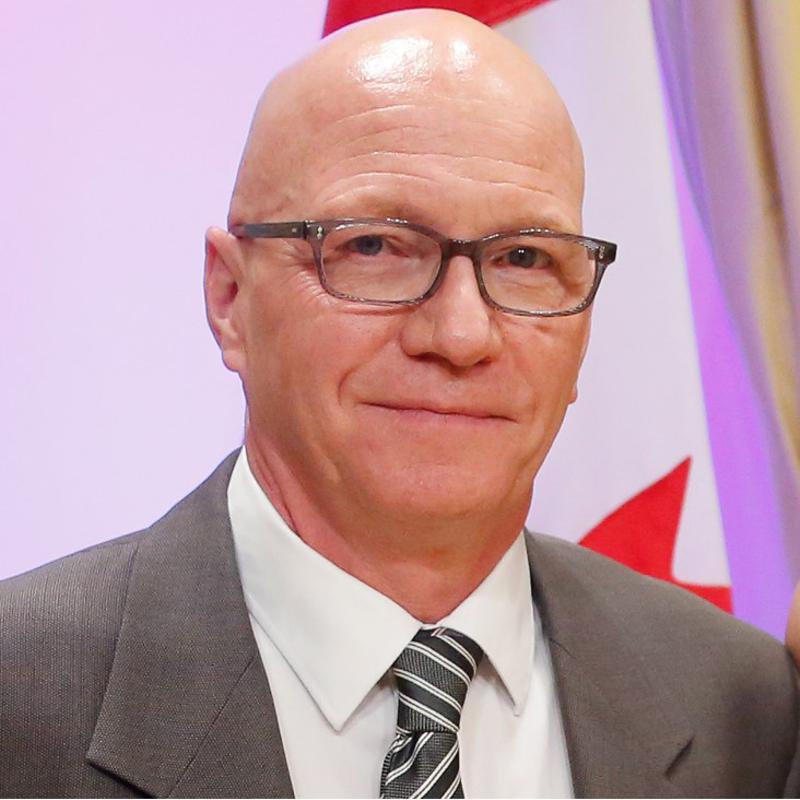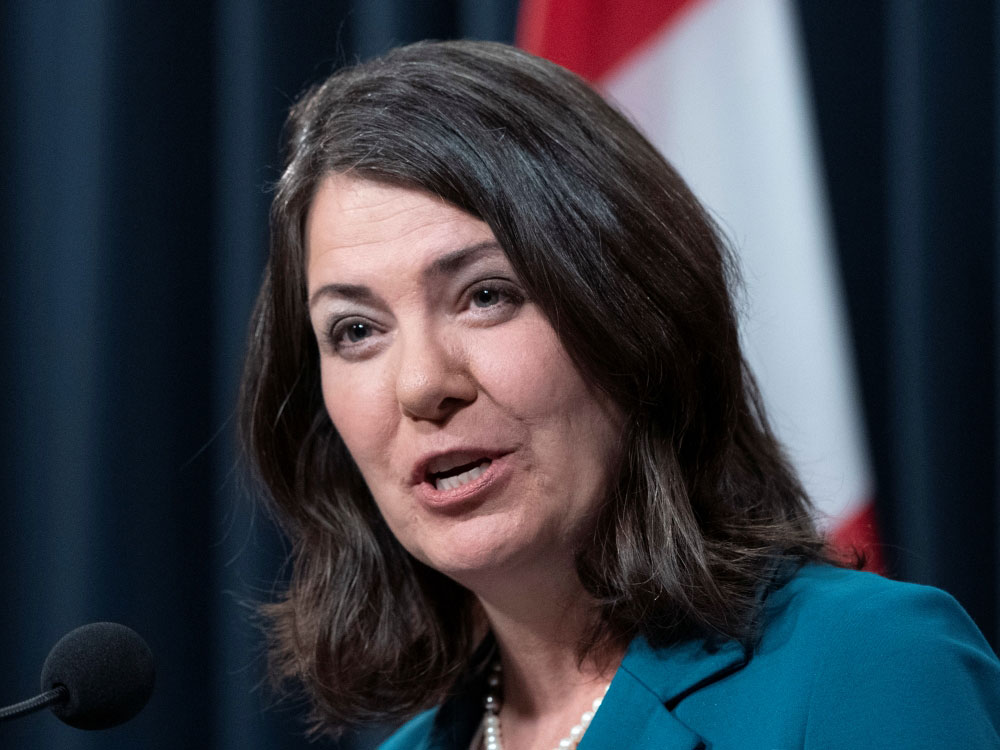Yet more evidence emerged Wednesday that Alberta Premier Danielle Smith — despite her vigorous denials to the contrary — appears to have attempted to interfere in the criminal case of a far-right pastor charged in relation to the Coutts border blockade.
The Alberta NDP released a video, recorded by controversial Calgary street pastor and political gadfly Artur Pawlowski, in which he speaks over the phone with Premier Smith.
For 11 minutes, they discuss her and her staff’s attempt to intervene with Alberta justice officials in Pawlowski’s case. CBC News, which first broke the story of the alleged interference, had earlier obtained an audio recording of the conversation.
The phone conversation occurred sometime in early January. Pawlowski’s trial was held in Lethbridge on Feb. 2. He was prosecuted for a charge of criminal mischief and a separate offence under Alberta's Critical Infrastructure Defence Act. The verdict is expected in early May.
During the call, Smith reveals her discussions with senior Alberta justice officials about pandemic-related prosecutions were more frequent and specific than she previously admitted. Smith told Pawlowski she spoke with justice officials “almost weekly.”
But Smith stressed to Pawlowski that in those conversations with justice officials she had to be careful only to question whether there was a reasonable likelihood of conviction for the pandemic-related prosecutions and whether it was in the public interest to carry out the prosecutions.
At a news conference Wednesday, NDP justice critic Irfan Sabir again called for an independent investigation into allegations of interference by Smith and her staff. Sabir said it was inappropriate for Smith to be talking to someone facing criminal charges.
University of Alberta political scientist Jared Wesley said this latest revelation is unlikely to change how committed United Conservative Party voters, particularly in the province’s critical rural ridings, will vote in the May provincial election. It could, however, undermine the UCP’s chances of gaining seats in Calgary, another crucial battleground in the race for a majority government.
Wesley and a team of researchers have been conducting focus groups with rural Albertans over the past three years as part of the Common Ground research initiative.
“Knowing what I know of them, I'm not sure they would look at a story like this and say there is anything new,” Wesley said. “So for those of us that were already paying attention, this confirms what (the Smith government) had been denying.
“But I'm not sure that the average Albertan would get what the rest of us know is so explosive about this video,” he said.
“To me, my first reaction is how in the world a brand new premier would have 10 minutes in her schedule to hold a conversation like this.”
Wesley said the video reconfirms what Smith’s priorities were weeks after becoming premier.
“And it definitely doesn't align with what Albertans were focusing on,” Wesley said, adding that the video will keep the scandal alive at a time “when the UCP needs to change the channel if they hope to have any hope of winning seats in Calgary.
“This is not a winning issue for them. It's another news cycle, if not two or three, because we know the premier will come out and say something, as she did preemptively today that she is going to have to backtrack on and now we're in a new cycle.
“It's another two weeks talking about stuff that she doesn't want to talk about,” Wesley said. “So it doesn't help her in any way.”
Smith pre-empted the CBC story by issuing a statement on Twitter in which she accused the CBC of continuing its “defamatory” campaign against her.
Wesley said Smith and her advisors are attempting to twist the scandal into an attack on the CBC specifically, and the mainstream media more broadly.
“Which drums up dollars for them, and allows them to talk about this story, not as a matter of prosecutorial interference and mistaken priorities, but instead it's about everybody is out to get Danielle Smith,” Wesley said.
“And by extension, they're out to get you too. And that message just does not resonate with Albertans.”
Jon Havelock was justice minister and attorney general in the government of premier former Ralph Klein.
Havelock said Klein would sometimes get frustrated about a case before the court and would on a rare occasion say something publicly.
“I would have to chat with him about what he could and couldn't say,” Havelock said, noting that Danielle Smith had publicly stated during the leadership campaign that she thought people charged for pandemic-related crimes should be pardoned.
“Typically, when you have a case before the court, you should be saying absolutely nothing. You should be doing nothing,” Havelock said.
“You need to let the prosecution proceed, independent of the political process and interference. Otherwise, you're going to wind up with a situation similar to what they’re facing with the Manhattan district attorney, where Congress is attempting to interfere in the administration of justice and the process.”
Several Republican politicians are attempting to interfere in the investigation by Manhattan district attorney Alvin Bragg into former president Donald Trump.
“Justice needs to not only be fair, but be seen to be fair, it's that simple,” Havelock said.
“And when you have politicians interfering in the process on behalf of someone, that calls into question the entire process and the criminal proceeding itself.”
Democracy Watch co-founder Duff Conacher said Smith’s interference in this case, and other pandemic-related cases, raises the spectre of Smith interfering in other cases for people or causes that she personally and politically supports.
Conacher was a harsh critic of Prime Minister Justin Trudeau for his involvement in the 2018 SNC-Lavalin scandal. The federal ethics commission found Trudeau had himself, and through his officials, exerted influence on then justice minister Jody Wilson-Raybould to resolve the case.
During the call with Pawlowski, Smith said she was mindful of the parallels to that case.
"That is how the prime minister got himself in such hot water, because he was in a position where he asked the same questions that I did," Smith said.
"We have these conventions in our system," Smith concluded to Pawlowski. "So I am trying to stay within the lines and asking them the appropriate questions."
Conacher said he believed Trudeau should have been charged with obstruction of justice, and so should Smith, even if she only spoke with the deputy minister of justice.
“That is obstruction of justice,” said Conacher, who recently completed a doctorate in law at the University of Ottawa. “You can't be doing that.”
“It is just like contacting a judge. You are trying to preempt a prosecution. But that is just as influential as calling the judge and trying to affect the ruling in a prosecution.
“And to be pressuring the deputy minister is no different than pressuring the minister.” ![]()
Read more: Rights + Justice, Politics, Alberta

















Tyee Commenting Guidelines
Comments that violate guidelines risk being deleted, and violations may result in a temporary or permanent user ban. Maintain the spirit of good conversation to stay in the discussion and be patient with moderators. Comments are reviewed regularly but not in real time.
Do:
Do not: